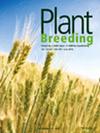应用诱变法分离秋葵黄脉花叶病毒(YVMV)抗性突变体
IF 1.8
4区 农林科学
Q2 AGRONOMY
引用次数: 0
摘要
秋葵(L.)对黄脉花叶病毒(YVMV)疾病高度敏感的Moench需要对其抗性进行遗传改良。采用两种最佳剂量的γ辐射,即350戈瑞和450戈瑞,对果实品质优良但极易受YVMV病影响的品种Pusa Sawani实施诱变方案。与亲本基因型Pusa Sawani相比,在M5代中分离到的两个假定突变家族350//10// 3-9////28和450//66// 2-4////39对YVMV病表现出一致的抗性。在M6代中,8个形态特征和5个数量特征在突变体和普沙瓦尼之间存在显著差异。两个抗yvmv突变体叶片的比邻成分和酶活性显著升高。在防虫笼人工接种下进行疾病筛选,证实这些突变体具有YVMV抗性。DNA指纹图谱进一步证实了这两个分离突变体与亲本基因型相比发生的改变。这些突变体值得对抗yvmv品种的开发给予应有的重视。本文章由计算机程序翻译,如有差异,请以英文原文为准。
Isolation of yellow vein mosaic virus (YVMV)-resistant mutants of okra (Abelmoschus esculentus L.) through applied mutagenesis
Okra, Abelmoschus esculentus (L.) Moench, being highly susceptible to yellow vein mosaic virus (YVMV) disease warrants its genetic improvement for resistance. Applied mutagenesis programme using two optimum doses of gamma radiation, namely, 350 Gy and 450 Gy radiation, was administered for the variety Pusa Sawani rated as excellent for fruit quality but highly susceptible to YVMV disease. Two selected putative mutant families, namely, 350//10///3-9////28 and 450//66///2-4////39, isolated in the M5 generation with slightly different plant morphology as compared to the parental genotype, Pusa Sawani, showed consistent resistance against YVMV disease. Upon evaluation in the M6 generation, eight morphological characteristics and five quantitative characteristics differed significantly among the mutants and Pusa Sawani. Proximate compositions and enzyme activity in leaf were significantly higher in the two YVMV-resistant mutants. Disease screening under artificial inoculation in the insect proof cages confirmed YVMV resistance in these mutants. DNA fingerprinting further validated the alterations occurred in these two isolated mutants compared to the parental genotype. These mutants deserve due attention towards the development of YVMV-resistant variety.
求助全文
通过发布文献求助,成功后即可免费获取论文全文。
去求助
来源期刊

Plant Breeding
农林科学-农艺学
CiteScore
4.40
自引率
5.00%
发文量
74
审稿时长
3.0 months
期刊介绍:
PLANT BREEDING publishes full-length original manuscripts and review articles on all aspects of plant improvement, breeding methodologies, and genetics to include qualitative and quantitative inheritance and genomics of major crop species. PLANT BREEDING provides readers with cutting-edge information on use of molecular techniques and genomics as they relate to improving gain from selection. Since its subject matter embraces all aspects of crop improvement, its content is sought after by both industry and academia. Fields of interest: Genetics of cultivated plants as well as research in practical plant breeding.
 求助内容:
求助内容: 应助结果提醒方式:
应助结果提醒方式:


